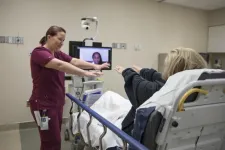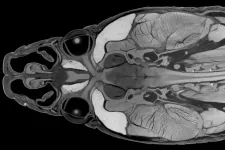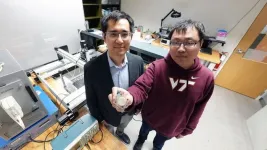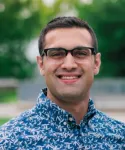(Press-News.org) Key stroke-care metrics improve at telestroke hospitals with stroke center certification and stroke coordinators.
That’s what NORC researchers at the University of Chicago found when they conducted an external evaluation of the telestroke program at the Medical University of South Carolina. NORC, which stands for National Opinion Research Center, and MUSC researchers report their findings in the Journal of Stroke & Cerebrovascular Diseases.
Mithuna Srinivasan, Ph.D., principal research scientist at NORC, is the lead author of the article and MUSC telestroke and telehealth experts Christine Holmstedt. D.O., Jillian Harvey, Ph.D., Ryan Kruis, Ph.D., and Shay McLeod are co-authors.
MUSC was chosen by the Centers for Disease Control and Prevention for evaluation by NORC to generate practice-based evidence and inform telehealth practice
Stroke is a leading cause of death and life-changing disability, and almost 800,000 people in the U.S. have strokes each year. Most of those strokes are ischemic or caused by a blood clot blocking an artery. Long-term disabilities due to ischemic stroke can often be minimized if patients receive appropriate treatment, but these must be administered within a very tight time frame of a few hours. Yet many people do not live near stroke centers where such therapies are available.
Telestroke was implemented to address this problem, using technology to allow specialists at hub hospitals to communicate with physicians and evaluate stroke patients at spoke hospitals across the state or region. A hub-and-spoke model organizes care through a central hub and secondary spokes: Hub facilities offer a full range of services, whereas spoke facilities offer fewer intensive services.
The impact of telestroke on stroke care and outcomes is widely acknowledged to be revolutionary. Undoubtedly, it has been a game-changer for improving stroke care in South Carolina, where MUSC launched its telestroke program in 2008.
“The telestroke program has had a huge impact on the ability of South Carolinians, especially those living in rural parts of the state, to access specialized stroke care,” said McLeod, telehealth nurse manager for acute care services at MUSC.
Thanks to the telestroke program, all residents of the state now live within an hour of specialized stroke care.
Although the program had always conducted its own rigorous assessments and made improvements based on the data, its leaders were delighted by the opportunity for an independent evaluation by NORC and pleased that its findings showed the program’s impact on patient care.
“The assessment confirms that stroke patient outcomes improve through the development of an evidence-based telestroke program,” said Holmstedt, who is the program’s physician leader. “Our hope is to inspire other institutions to develop similar programs to provide stroke care where it is needed most.”
Telestroke’s impact on the quality of stroke care is widely acknowledged, but it is less clear which aspects of telestroke are the most beneficial.
NORC and the MUSC researchers set out to examine whether two telehealth components, stroke center certification and stroke center coordinators, improve door-to-needle (DTN) time, or the time it takes after arrival at the hospital for eligible patients to be administered the clot-busting drug tPA, which can minimize disabilities post-stroke.
The study showed that spoke hospitals with both stroke certification and stroke coordinators had substantially better DTN times.
“Our unadjusted analysis showed that, compared with spoke hospitals with neither of these two components, encounters at hospitals with both had nearly 20-minute faster DTN times,” said Srinivasan.
Harvey believes that the findings of this external evaluation reaffirm the efforts of many of the spoke hospitals in MUSC’s telestroke program.
“The findings highlight the additional benefits of employing stroke coordinators and taking the additional steps needed to become a stroke center,” she said.
Srinivasan agrees and sees the importance of these findings for telestroke programs across the country.
“Having foundational infrastructure or stroke-care components, such as stroke coordinators and stroke center certifications, can certainly help to improve the quality of stroke care under a telestroke program.”
In the study, smaller-sized and rural hospitals showed the strongest association between these two components of stroke infrastructure and improved DTN times.
“This might be due to a resource issue,” said Harvey. “Larger hospitals already have a lot of resources and economies of scale, but bringing additional support to small- and medium-sized hospitals might be more meaningful and more impactful.”
Finally, the study noted inequities in the distribution of telestroke resources. It documented fewer telestroke encounters for racial and ethnic minorities and found that many of them were treated in spoke hospitals without stroke center certification or stroke coordinators.
“As we scale up telestroke, we should take into account that rural and small hospitals may be less likely to acquire the components of stroke care tied to improved outcomes,” said Srinivasan. “In rolling out telestroke, we must take care not to exacerbate disparities and lack of telestroke access.”
Further studies are needed to explore the impact of other telestroke components, such as leadership and funding support, on stroke center metrics. Such studies would identify the elements of telestroke infrastructure most responsible for improved stroke-care metrics, providing a roadmap for efficient and equitable telestroke implementation.
# # #
About the Medical University of South Carolina
Founded in 1824 in Charleston, MUSC is the state’s only comprehensive academic health system, with a unique mission to preserve and optimize human life in South Carolina through education, research and patient care. Each year, MUSC educates more than 3,200 students in six colleges – Dental Medicine, Graduate Studies, Health Professions, Medicine, Nursing and Pharmacy – and trains more than 900 residents and fellows in its health system. MUSC brought in more than $300 million in research funds in fiscal year 2023, leading the state overall in research funding. MUSC also leads the state in federal and National Institutes of Health funding. For information on academic programs, visit musc.edu.
As the health care system of the Medical University of South Carolina, MUSC Health is dedicated to delivering the highest-quality and safest patient care while educating and training generations of outstanding health care providers and leaders to serve the people of South Carolina and beyond. Patient care is provided at 16 hospitals (includes owned or governing interest), with approximately 2,700 beds and four additional hospital locations in development, more than 350 telehealth sites and nearly 750 care locations situated in all regions of South Carolina. In 2023, for the ninth consecutive year, U.S. News & World Report named MUSC Health University Medical Center in Charleston the No. 1 hospital in South Carolina. To learn more about clinical patient services, visit muschealth.org.
MUSC has a total enterprise annual operating budget of $5.9 billion. The nearly 26,000 MUSC family members include world-class faculty, physicians, specialty providers, scientists, students, affiliates and care team members who deliver groundbreaking education, research, and patient care.
END
Stroke-care metrics improve with stroke center certification and coordinators
External evaluation of the Medical University of South Carolina's telestroke program confirms that stroke center certification and stroke coordinators improve stroke-care metrics.
2024-05-22
ELSE PRESS RELEASES FROM THIS DATE:
Young people are increasingly using Wegovy and Ozempic
2024-05-22
Public interest in weight loss drugs like Wegovy and Ozempic is surging, but national data on dispensing patterns in the United States are surprisingly scarce.
Now, a national study from Michigan Medicine shows that the use of these weight loss drugs is increasing rapidly in adolescents and young adults 12-25 years, especially females.
Using 2020 - 2023 data from a national database representing 92% of pharmacies, the study team found a 594% increase in the monthly number of adolescents and young adults using Wegovy, Ozempic, and other glucagon-like peptide-1 receptor agonists ...
UArizona Health Sciences professor uses CT network to promote public access to open science
2024-05-22
Reading about the latest scientific discovery – such as the unearthing of a fossil representing a new species of tiny dinosaur – can be fascinating. But what if it were possible to do more than just read about it? What if you could go online, download a digital model and 3D print an exact replica of that fossil within minutes of reading the news? That is the goal of the Non-Clinical Tomography Users Research Network, or NoCTURN, an international group of researchers spearheaded by theUniversity of Arizona Health Sciences, the American ...
Designing autism-inclusive healthcare environments
2024-05-22
Autism is the most common neurodevelopmental disorder in the U.S., affecting an estimated one out of 36 children. Most people with autism experience unique sensory features such as differences in reactivity to touch, sounds, and sights or difficulty managing multiple sensory inputs at the same time.
These sensory differences can make the healthcare environment — often characterized by fluorescent lights, idle waiting rooms and uncomfortable pokes and prods — difficult to navigate, preventing children with autism from getting the care they need. To change that, occupational therapists Roseann ...
Zhenhua Tian receives National Science Foundation CAREER award to develop invisible acoustic tweezers
2024-05-22
Medical procedures capable of moving cells inside the body without making incisions have unique benefits. From faster recovery times to less trauma impacting the body, the list of reasons to do surgery without scalpels is growing with the technology used to perform noninvasive treatments.
A new method that might be available in the future is coming to life through research conducted by Zhenhua Tian’s team. The assistant professor in the Department of Mechanical Engineering is using tube-shaped acoustic energy to capture tiny biological ...
Community science volunteers can set scientific world abuzz with new bumble bee sightings
2024-05-22
TORONTO, May 22, 2024 – Community science volunteers – laypeople with an interest in bees and conservation – significantly contribute to the scientific knowledge of native bumble bees across Canada and the United States, finds a new study by York University.
It’s buzz worthy confirmation that community science programs can play an important role in monitoring the changing distributions of bumble bees and more. Community scientists have importantly also detected several at-risk or endangered species in unexpected locations, including the rusty-patched bumble bee and the gypsy cuckoo bumble bee. Trained scientists often haven’t seen some ...
Proximity to a cancer center contributes to cancer stage at diagnosis, study finds
2024-05-22
Location, race and insurance status play a significant part in the odds of a patient being diagnosed with early-stage or late-stage cancer, according to a detailed medical records analysis of more than 94,000 patients with cancer by researchers at the Johns Hopkins Bloomberg School of Public Health and the Johns Hopkins Kimmel Cancer Center.
Patients who lived farther away from a facility designated a comprehensive cancer center (CCC) by the National Cancer Institute (NCI) and who received only a diagnosis or only treatment at the center had higher than average odds of a late-stage diagnosis, ...
Study suggests it may be safe to de-escalate surgery in middle-aged breast cancer patients
2024-05-22
Surgery involving sentinel lymph node biopsy for middle-aged women with estrogen receptor-positive (ER+) breast cancer may do more harm than good, according to a new study led by University of Pittsburgh and UPMC Hillman Cancer Center researchers. The team used a novel artificial intelligence pipeline developed by Realyze Intelligence, a UPMC Enterprises portfolio company, to analyze electronic health records.
The findings, published today in JCO Clinical Cancer Informatics, suggest that clinical guidelines for de-escalating surgery in women aged over 70 years with early-stage ER+ breast cancer may be safely ...
Eating more ultra-processed foods tied to cognitive decline, stroke
2024-05-22
MINNEAPOLIS – People who eat more ultra-processed foods like soft drinks, chips and cookies may have a higher risk of having memory and thinking problems and having a stroke than those who eat fewer processed foods, according to a new study published in the May 22, 2024, online issue of Neurology®, the medical journal of the American Academy of Neurology. The study does not prove that eating ultra-processed foods causes memory and thinking problems and stroke. It only shows an association.
Ultra-processed foods are high in added sugar, fat and salt, and low in protein and fiber. They include soft drinks, salty and sugary snacks, ...
What factors predict when older adults will stop driving?
2024-05-22
MINNEAPOLIS – What factors lead older adults to stop driving? A new study followed older adults who had no memory or thinking problems to examine this question. The study is published in the May 22, 2024, online issue of Neurology®, the medical journal of the American Academy of Neurology.
“Alzheimer’s disease develops over a long time—people may have a 10- to 15-year period where they have no symptoms, but the disease process is developing in the brain,” said study author Ganesh M. Babulal, PhD, OTD, of Washington University School of Medicine in St. ...
Subtle cognitive decline precedes end to driving for older adults
2024-05-22
One of the thorniest decisions facing older adults is when to give up their keys and stop driving. A new study by researchers at Washington University School of Medicine in St. Louis could provide guidance in helping seniors plan ahead. The researchers found that impaired cognitive function foreshadows the decision for many seniors to stop driving — more so than age or molecular signs of Alzheimer’s disease. Even very slight cognitive changes are a sign that retirement from driving is imminent. Further, women are more likely to stop driving than ...
LAST 30 PRESS RELEASES:
New study calls for personalized, tiered approach to postpartum care
The hidden breath of cities: Why we need to look closer at public fountains
Rewetting peatlands could unlock more effective carbon removal using biochar
Microplastics discovered in prostate tumors
ACES marks 150 years of the Morrow Plots, our nation's oldest research field
Physicists open door to future, hyper-efficient ‘orbitronic’ devices
$80 million supports research into exceptional longevity
Why the planet doesn’t dry out together: scientists solve a global climate puzzle
Global greening: The Earth’s green wave is shifting
You don't need to be very altruistic to stop an epidemic
Signs on Stone Age objects: Precursor to written language dates back 40,000 years
MIT study reveals climatic fingerprints of wildfires and volcanic eruptions
A shift from the sandlot to the travel team for youth sports
Hair-width LEDs could replace lasers
The hidden infections that refuse to go away: how household practices can stop deadly diseases
Ochsner MD Anderson uses groundbreaking TIL therapy to treat advanced melanoma in adults
A heatshield for ‘never-wet’ surfaces: Rice engineering team repels even near-boiling water with low-cost, scalable coating
Skills from being a birder may change—and benefit—your brain
Waterloo researchers turning plastic waste into vinegar
Measuring the expansion of the universe with cosmic fireworks
How horses whinny: Whistling while singing
US newborn hepatitis B virus vaccination rates
When influencers raise a glass, young viewers want to join them
Exposure to alcohol-related social media content and desire to drink among young adults
Access to dialysis facilities in socioeconomically advantaged and disadvantaged communities
Dietary patterns and indicators of cognitive function
New study shows dry powder inhalers can improve patient outcomes and lower environmental impact
Plant hormone therapy could improve global food security
A new Johns Hopkins Medicine study finds sex and menopause-based differences in presentation of early Lyme disease
Students run ‘bee hotels’ across Canada - DNA reveals who’s checking in
[Press-News.org] Stroke-care metrics improve with stroke center certification and coordinatorsExternal evaluation of the Medical University of South Carolina's telestroke program confirms that stroke center certification and stroke coordinators improve stroke-care metrics.






